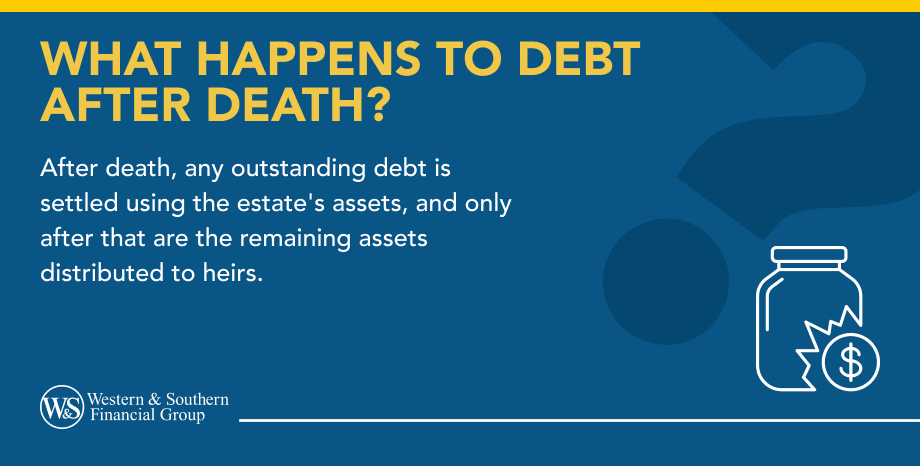

Table of Contents
Key Takeaways
After death, your estate is responsible for paying off your debts using the remaining assets.
If there are insufficient assets, the executor may need to sell property or assets to generate cash for debt payment.
Jointly held debts, cosigned loans, and debts in community property states may require your loved ones to assume responsibility for repayment.
Life insurance can provide a death benefit that can be used to pay off debts and ease the financial burden on your heirs.
Some debts may be forgiven or canceled upon death, depending on the type of debt and the available assets in the estate.
If you have debt in your name or you're thinking about estate planning, you may want to know more about what happens to debt after death. It may be tempting to ignore the issue or assume the worst, but learning the facts could help you plan for your family's future. Here's what you should know.
Who Pays for Debts When You Die?
Unfortunately, your debt does not die with you. You're responsible for any loans you agree to during your life.
After death, your estate, which is made up of your remaining assets, becomes responsible for your financial affairs. A personal representative (generally known as an executor) handles these finances for you.
Before giving property to your heirs, the personal representative will have to satisfy your debts. To do so, they'll likely gather information about what you own and what you owe, and they'll pay creditors out of your available assets.
As long as you apply for loans individually, your estate is responsible for paying. But the details vary from state to state, so consider seeking guidance from a legal expert in your state.
How Debts Could Eat Into Assets
Paying off loans is easy if you have enough cash in the bank to satisfy your debts. But if you don't have sufficient assets available, your executor may need to sell assets in your estate to generate cash. Those assets could include investments, valuables and other property.
What about your family home? You may worry that loved ones will lose your home if you have a significant mortgage balance. Fortunately, federal law allows heirs to take over your mortgage in some cases.1 But as with any loan, your heirs need to be able to keep up with payments or they could risk losing the property.
When Are Your Heirs Responsible?
In some cases, your loved ones may need to pay off your debts. That can happen if they agreed to take on debt with you or if they're otherwise obligated to pay. For example, survivors may be responsible due to:
- Joint borrowing: If you apply for a loan jointly with somebody else, both parties may be held responsible. That can happen with large loans like mortgages.
- Cosigning: If somebody helps you qualify for a loan by cosigning with you, they are typically responsible for the debt.
- Allowing an authorized user: If somebody adds you as an authorized user on their credit card and you add debt to that card, the primary cardholder must pay off the debt because it's in their name — not yours.
- Community property states: In certain states, spouses may be at least partially responsible for the debts of a deceased spouse.
Because your estate pays creditors out of your assets, your heirs receive less than they would have otherwise received. As a result, heirs effectively pay for your debts even if they don't actually pay money to anyone.
How Life Insurance May Be Able to Help
A life insurance policy could help your heirs keep their options open by providing a death benefit to help pay off your debts. If your heirs are concerned about ongoing housing payments, a death benefit could help make it easier to keep the home by providing cash to help cover debts and mortgage payments. However, you'll need to make sure you have the correct beneficiaries listed on your policy so the right individuals receive the death benefit. Your heirs can help pay off debts with a life insurance death benefit.
When Are Debts Forgiven After You Die?
In some cases, lenders cancel or forgive debts at death, leaving more assets available to your survivors. For example, federal student loans should be forgiven after a student dies, even if the parents took out PLUS Loans on the student's behalf, according to the U.S. Department of Education.2
Debts may also be canceled if your estate doesn't have enough assets to satisfy your creditors. When your estate is insolvent, there is no money leftover for your heirs, and any funds available must go to creditors according to state law. For example, the estate may need to pay funeral expenses and tax debts before paying off credit cards.
The Bottom Line
By understanding what happens to debt after death, you may be able to better plan for the future. Consider helping your loved ones prepare for any debts they may be responsible for and take steps to minimize the impact on your heirs when possible.
Sources
- Who’s Responsible For A Mortgage After The Borrower Dies? https://www.rocketmortgage.com/learn/who-is-responsible-for-a-mortgage-after-the-borrower-dies.
- Student Loan Forgiveness. https://studentaid.gov/manage-loans/forgiveness-cancellation#death.















